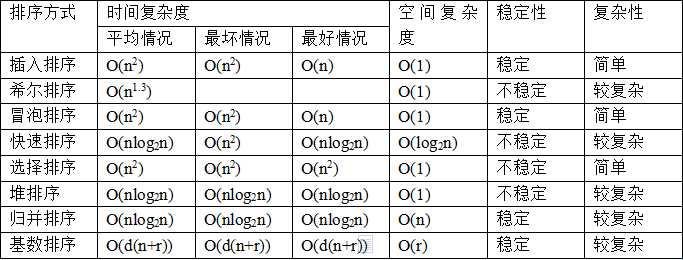标签:冒泡排序 等于 ima 算法 循环 pre 图片 index com
三种排序算法是在数组排序中用到比较多的,下面来具体说明各种排序方法以及区别
使用快速排序方法对a[n]排序
从a[n]中选择一个元素作为基准,一般选a[0],设定low指向a[0](队首),high指向a[n-1](队尾),
先从队尾开始向前扫描,若a[high]>a[0],则high++,否则将a[high]赋值给a[low],即a[low]=a[high]
然后从队首开始向前扫描,若a[low]<a[0],则low++,否则a[high]=a[low]
这样,会将所有小于基准数a[0]的元素放到a[0]左边,把大于a[0]的元素都放到a[0]右边
再使用递归分别对左边、右边的子数组进行排序,最终完成排序
1 //快速排序算法 2 static void quicksort(int arr[], int low, int high){ 3 int length = high; 4 if(low < high){ 5 int temp = arr[low];//temp是作为比较的基数 6 while(low < high){ 7 // 当队尾的元素大于等于基准数据时,向前挪动high指针 8 while(low < high && arr[high] >= temp){ 9 high--; 10 } 11 //此时是arr[high] < temp,将arr[high]赋值给arr[low] 12 arr[low] = arr[high]; 13 14 // 当队首的元素大于等于基准数据时,向后挪动low指针 15 while(low < high && arr[low] <= temp){ 16 low++; 17 } 18 //此时是arr[low] > temp, 将arr[low]赋值给arr[high] 19 arr[high] = arr[low]; 20 } 21 //当一轮循环过后,low = high时,此时的low或high就是temp的正确索引位置 22 //此时low位置的值并不是tmp,所以需要将temp赋值给arr[low] 23 arr[low] = temp; 24 int index = low;//返回temp的索引位置 25 26 // 递归调用,按照上述方法流程继续对index位置两端的子数组进行排序 27 quicksort(arr, 0, index-1); 28 quicksort(arr, index+1, length); 29 } 30 } 31 32 //冒泡排序,小到大 33 @Test 34 public void bubbleSort(){ 35 Scanner sc = new Scanner(System.in); 36 int temp, arr[]; 37 while(sc.hasNext()){//可循环进行测试 38 //输入数组长度和数组,比如:输入5回车后,再输入 1 3 4 2 6 39 int n = sc.nextInt(); 40 arr = new int[n]; 41 for(int i =0;i<n;i++){ 42 arr[i] = sc.nextInt(); 43 } 44 //数组中相临两数比较,前面的大于后者就交换位置 45 //冒泡排序:每一轮将依次出现一个最大数(最右边),次大数... 46 for(int i=0;i<n-1;i++){ 47 for(int j=0;j<n-1-i;j++){ 48 if(arr[j] > arr[j+1]){ 49 temp = arr[j]; 50 arr[j] = arr[j+1]; 51 arr[j+1] = temp; 52 } 53 } 54 } 55 //排序后 56 for(int i=0;i<n;i++){ 57 System.out.print(arr[i]+" "); 58 } 59 } 60 } 61 62 //选择排序,小到大 63 @Test 64 public void selectSort(){ 65 Scanner sc = new Scanner(System.in); 66 int temp, arr[]; 67 while(sc.hasNext()){//可循环进行测试 68 int n = sc.nextInt(); 69 arr = new int[n]; 70 for(int i =0;i<n;i++){ 71 arr[i] = sc.nextInt(); 72 } 73 //数组中每个数依次与它后面的数进行比较,若前者大于后者,交换二者位置 74 for(int i=0;i<n-1;i++){ 75 for(int j=i+1;j<n;j++){ 76 if(arr[i]>arr[j]){ 77 temp = arr[i]; 78 arr[i] = arr[j]; 79 arr[j] = temp; 80 } 81 } 82 } 83 //排序后 84 for(int i=0;i<n;i++){ 85 System.out.print(arr[i]+" "); 86 } 87 } 88 }
另外,冒泡排序和选择排序相似,时间复杂度也相同。
下面是各种排序算法的复杂度比较:

以上就是三种排序法的介绍,如有不足指出!
快速排序可参考:https://blog.csdn.net/nrsc272420199/article/details/82587933
int length = high;
标签:冒泡排序 等于 ima 算法 循环 pre 图片 index com
原文地址:https://www.cnblogs.com/superwei001/p/12038736.html